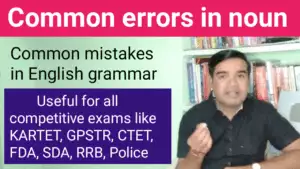Common errors in noun in English grammar. This topic is very useful for all competitive exams. Learn common errors in English grammar.
To get more video notes on English grammar visit our YouTube channel. This channel is very useful for all competitive exam preparation.
We make lot of mistakes while using noun in sentences. In most of the competitive exams these types of questions will be asked. In this session we will learn in details of this topic.
Types of noun: There are five types of noun:
1. Common noun: e.g: Boy, girl, student, teacher etc
2. Proper noun: e.g: Arudh, Ankush, Shrushti, Anjali etc
3. Collective noun: e.g: Army, team, family, committee etc
4. Material noun: e.g: Gold, wood, water, rock, leather etc
4. Abstract noun: (denotes idea, quality or state) Honesty, youth, truth, hate, love etc
Structures 1:
Each / every + Singular noun + singular verb
Each students got a prize. (incorrect)
Each student got a prize. (correct)
Structures 2:
Each of / Every of / neither of / Either of / one of + Plural noun + singular verb
One of my friend came to visit me. (incorrect)
One of my friends came to visit me. (correct)
Structures 3:
Many / Many of + plural noun + plural verb
Many student are not reading for exam. (incorrect)
Many students are not reading for exam. (correct)
Structures 4:
Many a + singular noun + singular verb
Many a writers is singing. (incorrect)
Many a writer is singing. (correct)
Structures 5:
In the possessive case: Noun + and + noun —– same thing.
I went to Arun’s and Anjali’s house and found that the couple missing. (incorrect)
I went to Arun and Anjali’s house and found that the couple missing. (correct)
# If definite numerical adjective is used before dozen, hundred, thousand, million, and billion we use these words without ‘s’ otherwise we use them with ‘s’.
E.g: Hundred of women came to park. (incorrect)
Hundreds of women came to part. (correct)
Five hundreds of men came to office. (incorrect)
Five hundred of men came to office. (correct)
Important rules of noun:
1. Some nouns always remain singular.
2. Some nouns always remain plural.
3. Some nouns always remain same in singular and plural.
1. Some nouns always remain singular:
E.g: poetry, scenery, advice, practice, information, luggage, baggage, furniture, mischief, fruit, bread, news, innings, physics, knowledge, food etc.
E.g: I saw lovely sceneries of Taj Mahal. (incorrect)
I saw lovely scenery of Taj Mahal. (Correct)
He is doing mischiefs. (incorrect)
He is doing mischief. (correct)
2. Some nouns always remain plural:
E.g: scissors, pants, trousers, binoculars, spectacles, specs, goods, vegetables, alms, cattle, police, people, public etc.
E.g: We will take vegetable and fruit. (incorrect)
We will take vegetables and fruit. (correct)
I am using spectacle. (incorrect)
I am using spectacles. (correct)
3. Some nouns always remain same in singular and plural:
E.g: deer, fish, sheep, team, jury, aircraft, dice, fruit, series etc
E.g : We are eating fishes.(incorrect)
We are eating fish. (correct)
I am buying fruits. (incorrect)
I am buying fruit. (correct)
Watch this video for the explanation of common errors in noun in English grammar.
